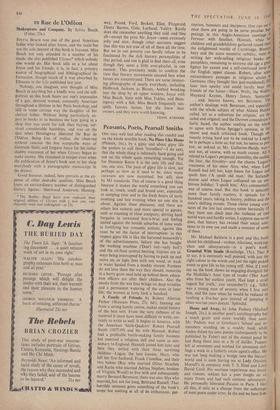To Rue de L'Odeon
Shakespeare and Company. By Sylvia Beach. (Faber, 25s.)
SYLVIA BEACH was one of the good American ladies who looked after Joyce, and the main but not the sole interest of this book is Joycean. Miss Beach not only attended to a number of his needs; she also published Ulysses* which nobody else would do. Her book tells us a lot about Joyce and his friends; it is, in fact, a primary source of biographical and bibliographical in- formation, though much of it was absorbed by Ellmann in the Life published last year.
Nobody, one imagines, ever thought of Miss Beach in anything but a kindly way, and the self- portrait in this book bears out one's impression of a gay, devoted woman, constantly American throughout a lifetime in her Paris bookshop, and still in some curious way the daughter of her clerical father. Without being particularly ex- pert in books or in business she kept going in a shop that was more for talk than buying, sur- vived considerable hardships, and was on the spot when Hemingway liberated the Rue de l'Oddon. Being free of malice, she observed without rancour the less acceptable ways of Gertrude Stein, and forgave Joyce for his rather shabby treatment of her when Ulysses began to make money. She remained in temper even when the publication of Joyce's book sent to her shop everybody with a pornographic manuscript in the drawer.
Good humour, indeed, here prevails at the ex- pense of other desirable qualities. Miss Beach knew an extraordinary number of distinguished literary figures: Sherwood Anderson, Hcming- * The Bodley Head have now replaced their original edition of Ulysses with a new one, very elegantly reset and redesigned—at 25s. way, Pound, Ford, Beckett, Eliot, Fitzgerald, Djuna Barnes, Gide, Larbaud, Valery. Rarely does she remember anything they said, and they all—except the prim Mr. Joyce—seem extremely jolly and nice, though other accounts suggest that this was not true of all of them all the time. But we in our poverty can hardly refuse to be fascinated by the rich literary personalities of that period, and one is glad to find them all, even though they seem a little over-playful, in one memoir. This proximity tends to confirm the view that literary movements succeed best when forces are concentrated. There are some interest- ing photographs of nearly everybody, including Holbrook Jackson as Bloom, Antheil breaking into the shop by an upper window, Joyce with Miss Beach, Stein with Miss Toklas, and Hem- ingway with a fish. Miss Beach frequently mis- spells famous names, but she knew their owners, and they were worth knowing.
FRANK KERMODE










































 Previous page
Previous page